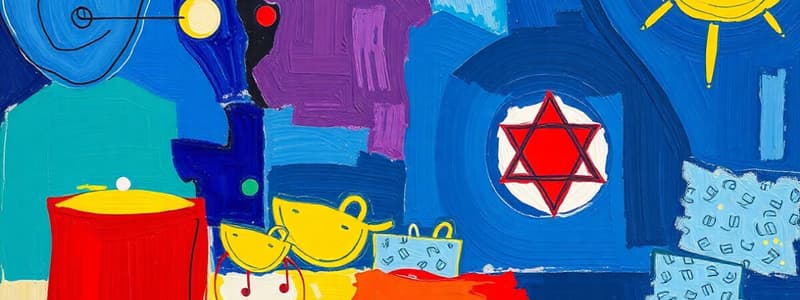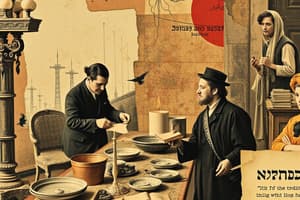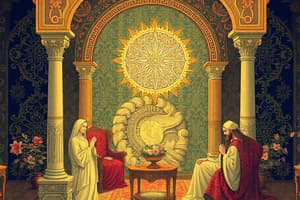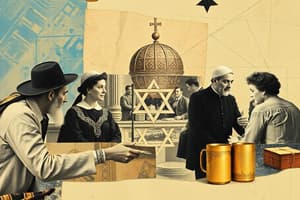Podcast
Questions and Answers
What is Hatarat Nedarim?
What is Hatarat Nedarim?
- A ritual involving fasting
- The blowing of the shofar
- The canceling of all promises and vows (correct)
- The celebration of the New Year
Why is Rosh HaShana chosen as the day of judgment?
Why is Rosh HaShana chosen as the day of judgment?
- It is a day of fasting and reflection
- It marks the creation of the world
- It is the anniversary of Adam Ha'Rishon's sin and judgment (correct)
- It is associated with the covenant of Abraham
What happens if someone is considered a Beinoni on Rosh Hashana?
What happens if someone is considered a Beinoni on Rosh Hashana?
- Their judgement is postponed until Aseret Yimei Teshuva and signed on Yom Kippur (correct)
- Their judgement is finalized on Yom Kippur
- They are exempt from any judgment
- They are judged immediately
What does the term 'Simana Milta' mean?
What does the term 'Simana Milta' mean?
What is Kapparot?
What is Kapparot?
What is the significance of asking forgiveness from people on Erev Yom Kippur?
What is the significance of asking forgiveness from people on Erev Yom Kippur?
What does the word Neila mean in the context of Yom Kippur?
What does the word Neila mean in the context of Yom Kippur?
What is the name of the final meal on Erev Yom Kippur?
What is the name of the final meal on Erev Yom Kippur?
Why do we wear white on Yom Kippur?
Why do we wear white on Yom Kippur?
What is the custom performed three times during Yom Kippur called?
What is the custom performed three times during Yom Kippur called?
What is the significance of performing Hatarat Nedarim before Rosh HaShana?
What is the significance of performing Hatarat Nedarim before Rosh HaShana?
What is the main purpose of saying selichot on Erev Rosh Hashana?
What is the main purpose of saying selichot on Erev Rosh Hashana?
During Rosh Hashana, what does being classified as a 'Beinoni' mean?
During Rosh Hashana, what does being classified as a 'Beinoni' mean?
What is the essence of the custom of Kapparot performed on Erev Yom Kippur?
What is the essence of the custom of Kapparot performed on Erev Yom Kippur?
Why is the reading of the book of Yona significant on Yom Kippur?
Why is the reading of the book of Yona significant on Yom Kippur?
What are the three categories of people mentioned during Rosh Hashana?
What are the three categories of people mentioned during Rosh Hashana?
Selichot are recited on Erev Rosh Hashana to seek forgiveness.
Selichot are recited on Erev Rosh Hashana to seek forgiveness.
What is the significance of the custom of eating apples in honey during Rosh Hashana?
What is the significance of the custom of eating apples in honey during Rosh Hashana?
The last meal before Yom Kippur is known as __________.
The last meal before Yom Kippur is known as __________.
Match the following customs with their descriptions:
Match the following customs with their descriptions:
What does 'Vidur' refer to during Yom Kippur?
What does 'Vidur' refer to during Yom Kippur?
Neila is the extra Shmone Esrei prayer recited only during Rosh Hashana.
Neila is the extra Shmone Esrei prayer recited only during Rosh Hashana.
What is the main purpose of eating on Erev Yom Kippur?
What is the main purpose of eating on Erev Yom Kippur?
During Rosh Hashana, if someone is a Beinoni, their judgment is __________ until Yom Kippur.
During Rosh Hashana, if someone is a Beinoni, their judgment is __________ until Yom Kippur.
Why is forgiveness important on Erev Yom Kippur?
Why is forgiveness important on Erev Yom Kippur?
Flashcards are hidden until you start studying
Study Notes
Rosh Hashanah
- Hatarat Nedarim is the cancelling of all promises and vows. It is done before Rosh Hashanah because breaking promises is a serious matter.
- On Erev Rosh Hashanah, it is customary to arise early and say selichot.
- Rosh Hashanah is chosen as the day of judgment because Adam HaRishon sinned and was judged on the same day, and so too are all of mankind.
- The three books refer to tzaddikim, beinonim, and reshaim, representing the righteous, average, and wicked.
- A Beinoni is someone whose scale is exactly even between good and bad deeds.
- If someone is considered a Beinoni on Rosh Hashanah, his judgment is postponed until Aseret Yimei Teshuva and signed on Yom Kippur.
- Simana Milta means "symbols are real," suggesting that rituals and symbolic actions have real meaning.
- Eating apples dipped in honey symbolizes a sweet and prosperous year.
Yom Kippur
- Kapparot is the custom of taking a chicken or money over one's head for atonement.
- On Erev Yom Kippur, the mitzvah is to eat.
- It is important to ask forgiveness from people on Erev Yom Kippur because Hashem only forgives sins between us and people if those people forgave us.
- When saying Vidur, one pounds their chest as an act of repentance.
- Seudat HaMafseket is the final meal eaten on Erev Yom Kippur.
- Four things you cannot do on Yom Kippur: eating, drinking, washing, applying oils/creams, and wearing leather shoes.
- Wearing white on Yom Kippur symbolizes purity and cleanliness.
- Kol Nidrei is a prayer that is said three times, each time a little louder.
- The extra Shmone Esrei that we add on Yom Kippur is called Neila.
- Neila means closing, signifying the closing of the gates of heaven.
- Reading the book of Jonah on Yom Kippur emphasizes the theme of repentance and Hashem's acceptance of it.
Rosh Hashanah
- Hatarat Nedarim: The cancellation of all promises and vows.
- Why Hatarat Nedarim is done before Rosh Hashanah: It's a serious matter to have promises broken.
- Erev Rosh Hashanah custom: Arise early and say selichot (penitential prayers).
- Rosh Hashanah as the day of judgement: Adam HaRishon (the first man) sinned and was judged on the same day, so too all of mankind.
- The Three Books:
- Tzadikim: Righteous people
- Beinonim: Average people
- Resha'im: Wicked people
- Beinoni: Someone whose deeds are balanced perfectly between good and bad.
- Beinoni's Judgement: His judgement is postponed till Aseret Yimei Teshuva (Ten Days of Repentance) and signed on Yom Kippur.
- Simana Milta: Symbols are real.
- The Mashal: A grandmother who forgot her grandchild's birthday.
Yom Kippur
- Kapparot: A custom where one takes chicken or money over their heads.
- Erev Yom Kippur Mitzvah: To eat.
- Importance of Asking Forgiveness on Erev Yom Kippur: Hashem only forgives sins between us and people if those people forgave us.
- Vidur: Pound your chest during the Vidur prayer.
- Seudat HaMafseket: The final meal on Erev Yom Kippur.
- Four Things You Cannot Do on Yom Kippur:
- Eat
- Drink
- Wash
- Annoynt oils or creams (or applying)
- Wear leather shoes
- Reason for Wearing White on Yom Kippur: The white symbolizes purity and cleanliness.
- Kol Nidrei: A prayer said three times, each time a little louder.
- Neila: The extra Shmone Esrei (Amidah prayer) added on Yom Kippur.
- Neila Meaning: Closing.
- Reason for Reading the Book of Jonah on Yom Kippur: It teaches that Hashem accepts repentance.
Rosh Hashana
- Hatarat Nedarim: A custom where one cancels all vows and promises made during the year.
- Reason for Hatarat Nedarim: It is a serious matter to have promises being broken, as it can cause spiritual harm.
- Custom on Erev Rosh Hashanah: Arise early and say Selichot (prayers for forgiveness).
- Reason for Rosh Hashanah as Judgement Day: Because Adam Ha'Rishon sinned and was judged on the same day, Rosh Hashanah is the day of judgment for all of mankind.
- The Three Books: To illustrate the different approaches to judgment, there are three books: Tzaddikim (the righteous), Beinonim (the intermediate), and Reshaim (the wicked).
- Beinoni: A person whose deeds are evenly balanced between good and bad and who is in a state of uncertainty.
- Beinoni on Rosh Hashanah: Their judgment is postponed until Aseret Yimei Teshuva, the ten days of repentance, and their fate is sealed on Yom Kippur.
- "Simana Milta": Meaning "symbols are real," emphasizing the profound meaning behind the symbolic actions performed during the holidays.
Yom Kippur
- Kapparot: A ritual where a chicken or money is passed over one's head on Erev Yom Kippur, symbolizing the transference of sins.
- Mitzvah on Erev Yom Kippur: The mitzvah (commandment) is to eat.
- Asking Forgiveness: It is crucial to ask forgiveness from those we have wronged before Yom Kippur because Hashem will only forgive sins between us and others if those individuals have forgiven us.
- Vidur: A prayer recited on Erev Yom Kippur, where one pounds their chest in repentance.
- Seudat HaMafseket: The final meal before Yom Kippur, a symbolic farewell to physical pleasures.
- Four Things Forbidden on Yom Kippur: Eating, drinking, annointing oils or creams (or applying), and wearing leather shoes.
- Reason for Wearing White: The white symbolizes purity and cleanliness, reflecting the spiritual cleansing sought on Yom Kippur.
- Kol Nidrei: A prayer recited three times, each time with increasing volume, seeking forgiveness for unintentional vows.
- Neila: The additional Shmone Esrei (Amidah, the main prayer) recited at the end of Yom Kippur.
- Meaning of Neila: "Closing," signifying the conclusion of the day of atonement.
- Reading the Book of Jonah on Yom Kippur: The book of Jonah serves as a reminder that Hashem accepts teshuva (repentance).
Studying That Suits You
Use AI to generate personalized quizzes and flashcards to suit your learning preferences.




